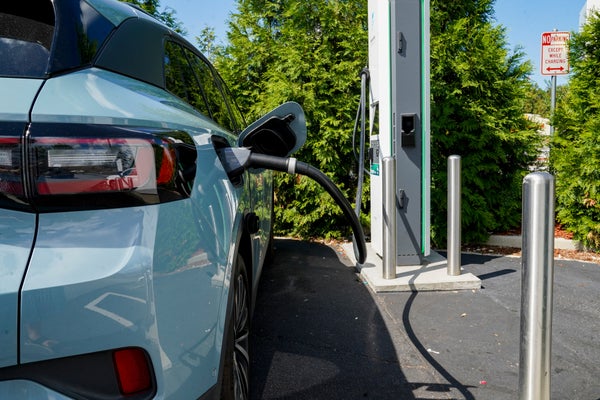
Trump Halts Funding to Build More Electric Vehicle Chargers Nationwide
www.scientificamerican.com
February 7, 20253 min readTrump Halts Funding to Build More Electric Vehicle Chargers NationwideThe Trump administration has halted funding for a $5-billion program that Congress created to help states build out their electric vehicle charging networkBy Mike Lee & E&E News An electric vehicle at an Electrify America charging station in Atlanta, Ga. Megan Varner/Bloomberg via Getty ImagesCLIMATEWIRE | The Trump administration has frozen funding for a $5 billion program to build a nationwide network of electric vehicle charging stations.The Federal Highway Administration sent a letter Thursday to state transportation departments, telling them "no new funding obligations may occur" under the National Electric Vehicle Infrastructure program.The agency said it was suspending approved state implementation plans, which allow states to access NEVI funds automatically allocated through a congressionally created formula. FHA is also pausing approval of new plans; states submit plans annually, describing where and how they plan to build the chargers.On supporting science journalismIf you're enjoying this article, consider supporting our award-winning journalism by subscribing. By purchasing a subscription you are helping to ensure the future of impactful stories about the discoveries and ideas shaping our world today.The move comes after two federal judges ordered the Trump administration to end its wide-ranging freeze on federal aid.The FHA letter said states would not be able to submit new plans and thus access the funds until the Department of Transportation updates the NEVI program guidance. DOT's leadership plans to bring NEVI into compliance with an order from Transportation Secretary Sean Duffy to prioritize funding for communities that have high birth and marriage rates and for those that enforce federal immigration law, according to the letter.The FHA letter specifies that while it is freezing new obligations, "reimbursement of existing obligations will be allowed in order to not disrupt current financial commitments."The move to freeze NEVI funds is likely to draw legal challenges from states that support the program.Im sure that states that have entered into contracts for a lot of construction work over the last several years will be seeking clarification over whats set out in the law and whats subject to the DOTs policy change, said Albert Gore, executive director of the Zero Emission Transportation Association.NEVI was created by the 2021 bipartisan infrastructure law, as part of a $7.5 billion effort to expand EV charging. The program is in its third year out of a five-year authorization, and a lot of the money has already been dispersed to the states, said Ryan Gallentine, managing director at Advanced Energy United, a trade group for EV-makers and charging companies.States are under no obligation to stop these projects based solely on this announcement. We call on state DOTs and program administrators to continue executing this program until new guidance is finalized, he said in a statement.NEVI was a high-profile part of the Biden administration's effort to promote electric vehicles, which also included billions of dollars in tax incentives for factories and battery plants and a $7,500 tax credit for EV purchases. Those carrots were paired with regulatory sticks: EPA wrote stringent emissions standards to push the car industry toward EVs, and DOT wrote fuel economy standards to make gas-powered cars more efficient.President Donald Trump has railed against the programs as an EV mandate and pledged to get rid of it.He signed an executive order unleashing American energy that specifically targeted NEVI funds and called on agencies to freeze funding from the Inflation Reduction Act and the infrastructure law. While two courts have ordered the administration to halt its funding freeze, the Trump administration has been slow to comply.NEVIs goal is to create a network of rapid charging stations every 50 miles on major highways, which would help alleviate the range anxiety that many EV supporters see as a barrier to their adoption. The office that oversees the funds, known as the Joint Office of Energy and Transportation, was able to convince carmakers to adopt a single standard for charging software and the connectors that plug into cars.But the program was slow to roll out, with the process of writing rules and approving state plans dragging on so long that no chargers were built in the first two years.Some states, particularly rural states like Wyoming, also argued that the programs rules were too restrictive. They argued that the requirement to locate the first chargers close to interstate highways would require building them along nearly deserted areas far from the regions few towns.Alabama announced in January it wont build any chargers using NEVI funds.About 59 percent of the governments broader $7.5 billion charging funds have been fully obligated, and theres strong demand for the remaining $3.3 billion, Gabe Klein, the joint offices executive director, said in January.This story also appears in Energywire.Reprinted from E&E News with permission from POLITICO, LLC. Copyright 2025. E&E News provides essential news for energy and environment professionals.
0 Comments
·0 Shares
·35 Views


